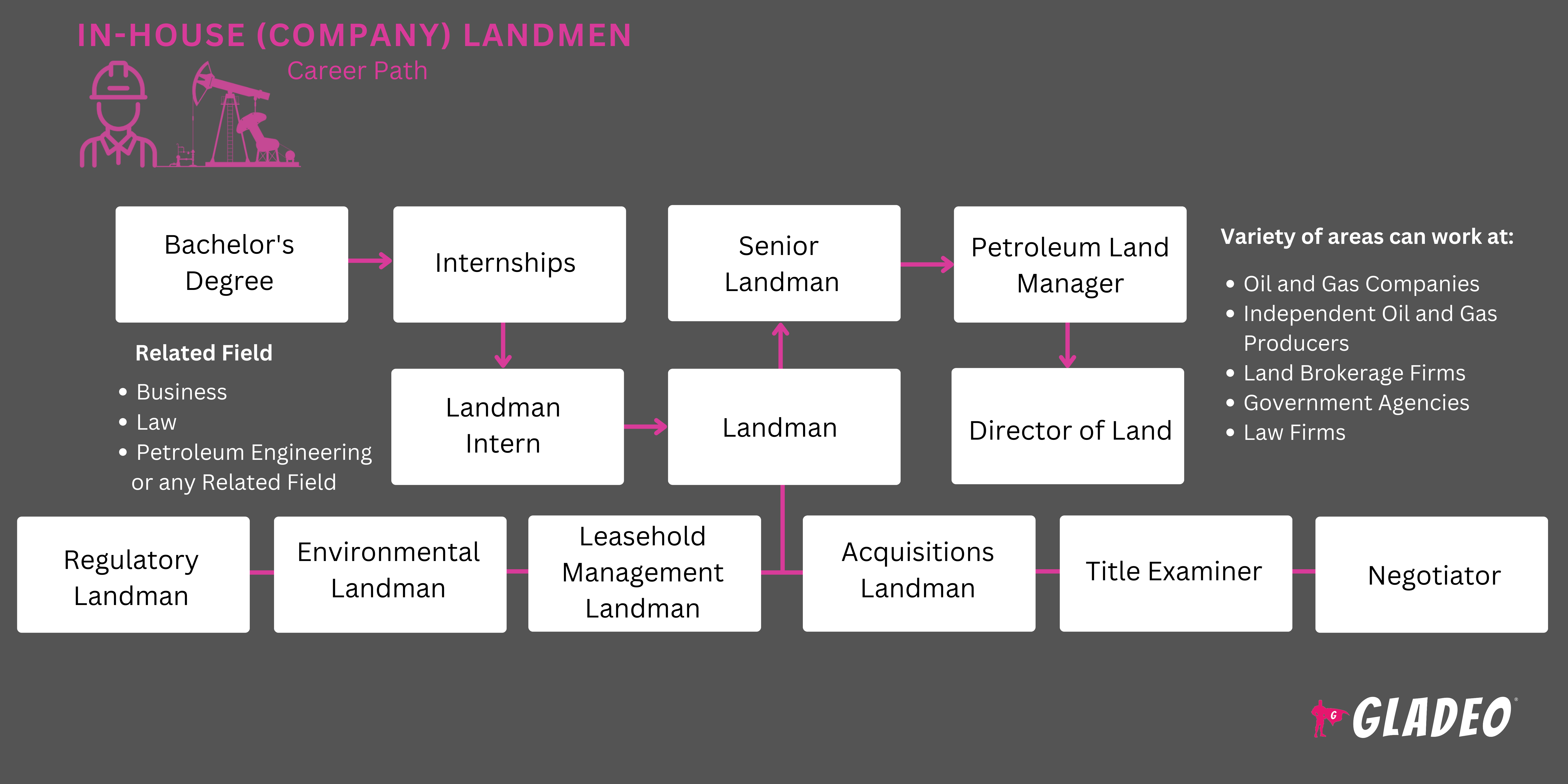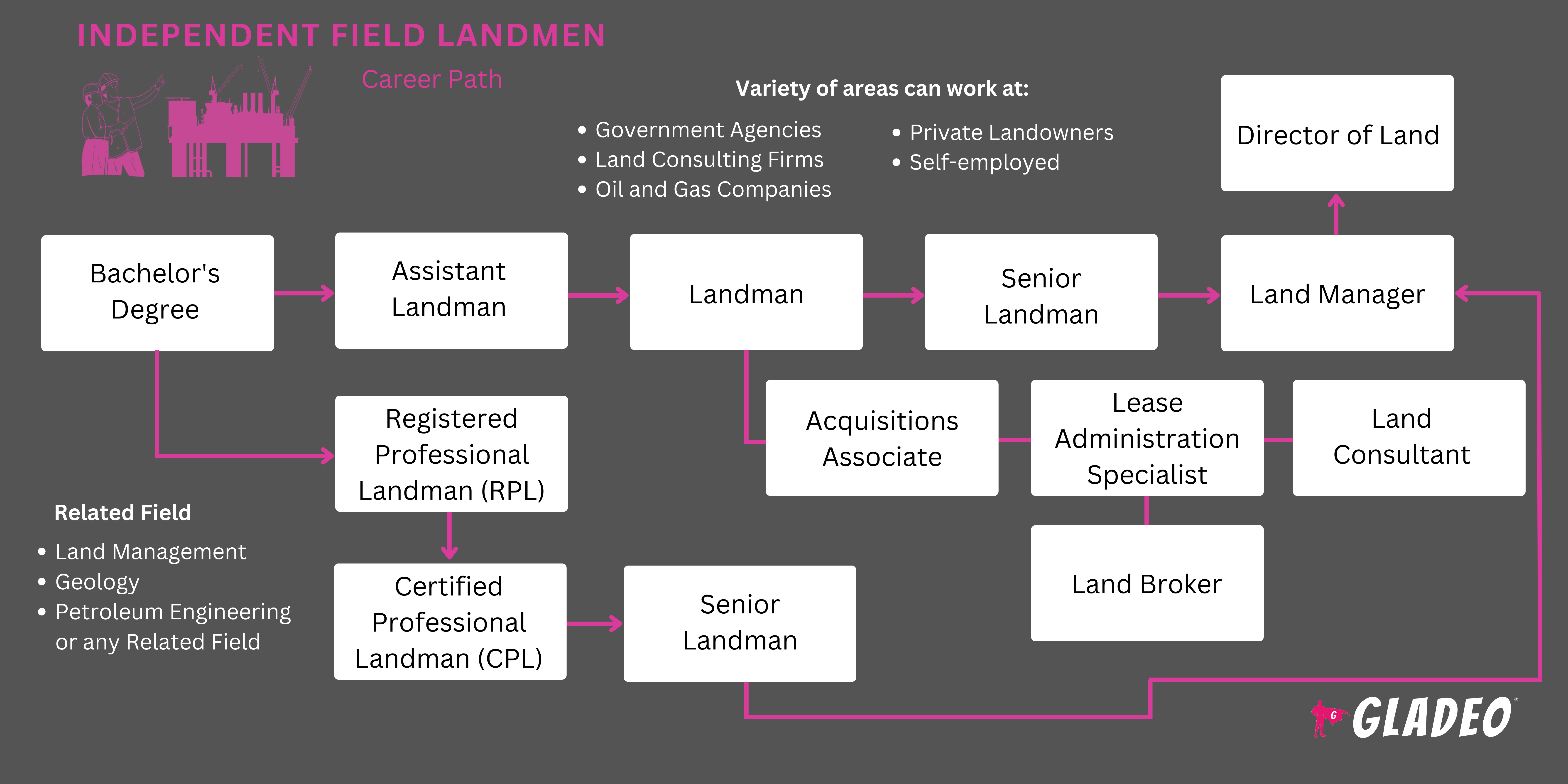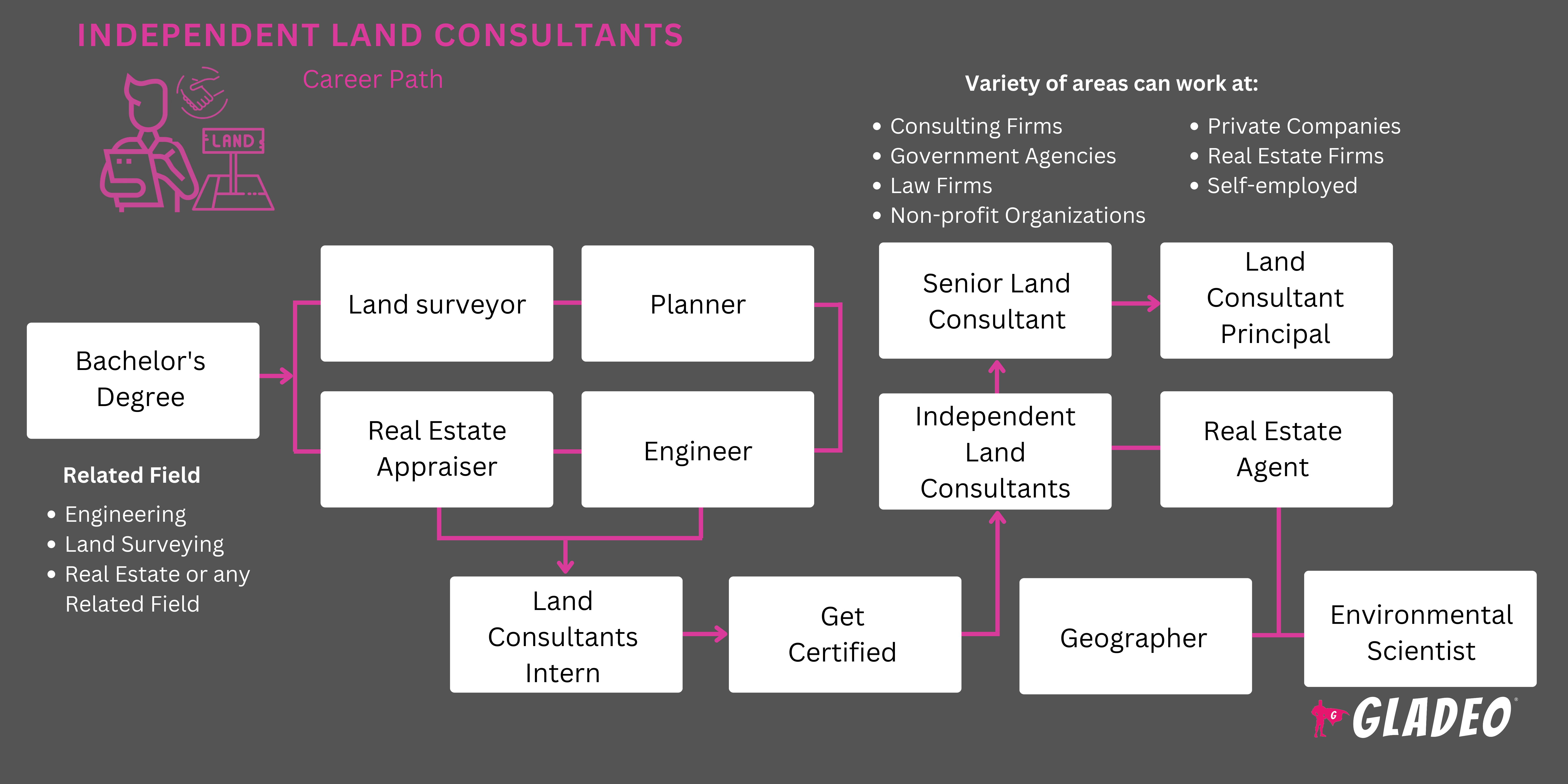Spotlights
In-House (Company) Landman / Independent Field Landman / Independent Land Consultant
Imagine you’re at home and someone knocks at the door and says they want to drill for oil on your property! Scenarios like this are actually common, and the person doing the knocking is called a “Landman.”
Some Landmen work independently (as Independent Field Landmen contractors or even as Independent Land Consultants); others are “in-house” Company Landmen employees working for a specific organization. Consultants, on the other hand, are often former Landmen who focus on giving advice on a project basis.
In-house and Independent Landmen have similar tasks; they represent a business that explores land in search of oil, gas, minerals, or other valuable resources. They act as a liaison between that business and the property owner (or rights holder) to discuss the potential acquisition or leasing of rights to the resources they might find.
Long before that happens, Landmen do their homework to examine geological and geographical data to find locations to explore, evaluate the economic viability of drilling at those sites, and consider any risks or obstacles. They also research property documents such as titles, leases, and contracts to ensure ownership details and boundaries.
There are numerous governmental regulations to comply with, but once negotiations with an owner are settled and a deal is reached, Landmen work with lawyers to draft up a contract for signatures. Afterward, that’s when the exploration and drilling operations can begin!
- Intellectually stimulating work that requires a wide range of skills including research and negotiation
- Chance to be well-compensated if securing valuable land or mineral rights that lead to profitable oil or gas production
- Opportunities for networking with landowners, legal professionals, and energy company executives
- Impacting future energy development projects
Working Schedule
- Landmen work full-time with overtime possible during busy periods. In-House Landmen work in company offices, but travel with overnight stays away from home may be needed, often in remote rural areas.
Typical Duties
- Examine geological and geographical data to find resource-rich locations to explore and potentially drill at
- Evaluate the economic viability of drilling at identified sites; consider risks or obstacles, such as challenging geographic features or boundary disputes
- Research property documents such as land titles, leases, and contracts to confirm ownership details, boundaries, etc.
- Note, that in some cases, there could be multiple owners with varying shares of ownership. There may also be easements or right-of-ways to consider
- Compile ownership information and generate ownership reports
- Create business development leads
- Call, email, or meet with landowners (and/or mineral rights holders, if different from the landowners) to discuss options and potentially negotiate a deal
- Work with attorneys to draft leases or acquisition contracts to be reviewed by all parties. Understand the different types of Pugh Clauses and their implications
- Anticipate and respond to questions or concerns about contracts or possible impacts of drilling operations. Arrange for signatures, if/when ready
- Facilitate contract modifications with attorneys
- Connect with applicable local agencies or offices to ensure positive relations
- Serve as the public face of the employer. Conduct community outreach as needed to address any public concerns related to upcoming exploration and drilling operations
- Keep up-to-date on local, state, and federal regulations to ensure continuing compliance
- Facilitate agreements between energy companies and landowners for oil and gas exploration or production
- For Independent Land Consultants — offer expert advice on land use, zoning, property acquisition, and development
- Work with developers, government agencies, or private landowners to optimize the value and use of land parcels
Additional Responsibilities
- Participate in professional organizations such as the American Association of Professional Landmen, whose mission is to “promote the highest standards and ethics of performance for all land professionals and to encourage sound stewardship of all energy and mineral resources.”
- Uphold legal and ethical standards, as required
Soft Skills
- Accountability
- Ethics
- Integrity
- Customer service
- Compliance-orientation
- Conflict resolution
- Persuasive
- Diligent
- Outgoing
- Detail-oriented
- Deductive reasoning
- Initiative
- Observant
- Organized
- Patient
- Problem-solving
- Salesmanship
- Strong communication skills
- Time management
- Teamwork
Technical Skills
- Basic computer skills
- Business acumen
- Data entry, data collection, and recordkeeping
- Environmental awareness (impacts on ecosystems, water sources, natural resources, etc.)
- Geographic Information Systems (GIS) viewers
- Knowledge of regulations related to land use, drilling permits, environmental impact assessments, etc.
- Land management software
- Lease and contract negotiation
- Market analysis trends, commodity prices, and other economic factors
- Negotiation techniques
- Project management
- Property law, contract law, real estate law
- Research skills for public records, historical documents, geological surveys, et al.
- Technical report writing
- Title examination (researching property titles, deeds, leases, and other legal documents to determine ownership and rights)
- Run sheets and title opinions
- Knowledge of easements, right-of-ways, and title curative actions
- Understanding of gas and oil drilling, production, and reservoir management
In-house (or company) Landmen are usually employed by oil and gas firms or corporations. However, Landmen in general—including Independent Field Landmen or Land Consultants—may work for different types of employers, with options such as:
- Consulting firms
- Energy investment firms
- Government agencies
- Landowner associations
- Law firms
- Mineral and royalty buyers
- Oil and gas service companies
- Pipeline companies:
- Real estate development companies
- Self-employed (independent Landmen)
- Title and abstract companies
Landmen are responsible for finding the best available opportunities, and then helping to negotiate the best deals between their company or client and the applicable landowners or rightsholders.
Because these deals can be quite lucrative, they must ensure they conduct extremely thorough research to identify all stakeholders before contracts start getting signed. Sometimes figuring out who owns rights may feel like trying to solve a puzzle, especially if records are very old (some historical deeds go back to the early 1900s). But Landmen must get it right (or at least to the best of their ability)! Otherwise, there could be sticky legal issues years or even decades later if property disputes arise.
Landmen need to collaborate with geologists, engineers, attorneys, and often other Landmen, such as independent contractors or consultants. It’s imperative they work ethically to ensure compliance with governmental regulations while preparing land for drilling operations, to avoid potential fines.
Drilling operations are benefiting from the increased emphasis on digitalization and automation, as companies integrate sensors, data analytics, and machine learning to optimize processes, enhance safety, and reduce costs. There’s also a shift to more sustainable practices, including more efficient drilling processes, reduced emissions, and better waste management.
Companies are adopting or improving upon advanced drilling techniques like horizontal drilling and hydraulic fracturing to reach resources in shale formations, giving a boost in production in certain states such as Texas, Colorado, North Dakota, New Mexico, Pennsylvania, Oklahoma, North Dakota, and others.
Landmen are usually outgoing and personable! As kids, they may have had some of the characteristics of a natural-born salesperson at an early age. In school, they may have developed a keen eye for small details and appreciated subjects like history, geography, math, and business. While the job attracts people from various walks of life, many Landmen grew up in rural areas with family ties to the energy sector, real estate, or the legal profession.
- Landmen usually need a bachelor’s in business, law, energy land management, geology, or a related subject. However, some may get their foot in the door with just an associate’s if they have enough relevant work experience
- Course topics may include:
- Energy Finance
- Energy Law
- Environmental Law
- Geographic Information Systems
- Landman Principles
- Negotiations
- Petroleum Fundamentals
- Real Property Law
- Employers might prefer to hire Landmen with a real estate license, which can take 4-6 months, on average
- Many schools offer helpful certificate programs in petroleum geology, which can contribute to the skills and knowledge Landmen need to possess
- Landmen sometimes earn a master’s in law or a Juris Doctor (JD) degree, which is helpful when dealing with land rights and lease or purchase contracts
- In addition, companies want Landmen with a few years of relevant job experience. Real-world sales experience can also be very helpful!
- Many Landmen (and consultants) start out working as interns, legal clerks, or real estate agents
- On-the-job training may also be provided, but the amount varies
- The American Association of Professional Landmen (AAPL) offers certifications that can boost one’s credentials, such as:
- Certified Professional Landman
- Registered Professional Landman
- Registered Landman
- Note, these certs are not mandatory but can “enhance a member’s credibility in the industry” and “increase earning potential.” Certifications must be renewed through continuing education, active landwork, and AAPL membership
- More optional certs include the National Association of Royalty Owners’ Certified Mineral Manager, the International Right of Way Association’s Certified Right of Way Agent, and Mobility Oil & Gas’ Advanced Contract Negotiation Training
- Because Landmen travel frequently, they are generally expected to hold a valid driver’s license
- In-House (Company) Landmen, Independent Field Landmen, and Independent Land Consultants usually need a bachelor’s degree in business, law, energy management, land and resource management, geology, or a related subject
- Seek programs with internships or opportunities to get practical experience
- Compare tuition and fees costs, noting in-state vs. out-of-state costs
- Review scholarship and financial aid options
- See if the program has any partnerships with companies that hire grads!
- Take note of graduation and job placement statistics for alumni
- Make physical fitness a priority because Landmen need plenty of stamina to travel to remote sites, check out locations, and negotiate contracts with landowners
- Important high school courses include geography, environmental sciences, social studies, business, finance, English, and math. Future Landmen also need to know how to use computer programs and databases, conduct research on historical records, and write accurate reports
- Learn about the roles and responsibilities of different types of Landmen and the professionals they collaborate with
- Do informational interviews with In-House (Company) Landmen, Independent Field Landmen, and Independent Land Consultants
- Ask about their jobs and where they went to school. Every day may be a little different for them, so see if it is possible to shadow them a few hours, over the course of 2-3 days
- Try to get a part-time job where you can gain experience in sales, real estate, or at your local courthouse or assessor's office. Even doing some paralegal work can provide valuable experience that’ll come in handy later!
- Get involved with college and professional organizations related to the field



- Check out job portals like Indeed.com, LinkedIn, Glassdoor, Monster, CareerBuilder, SimplyHired, ZipRecruiter, etc.
- Take note of keywords in job postings for In-House (Company) Landmen, Independent Field Landmen, and Independent Land Consultant jobs
- Tailor your resume to include the keywords while highlighting your relevant education and experience
- You probably won’t be able to start straight off as a Landman, so look for positions or associated positions like an intern at an oil and gas company, a legal clerk, or a real estate broker
- Look for local Landmen who are in business for themselves and ask if they have any openings (or would consider making one!)
- Also check out local brokerage companies that may offer professional development training courses
- In college, ask instructors or fellow students about openings they’re aware of or connections they have. Many jobs are found through networking!
- Ask working Landmen how they landed their jobs. They might be looking for a helper or intern
- Make a list of potential personal references. Get permission to share their contact info ahead of time
- Brush up on Landmen practices and terminology. During interviews, demonstrate your knowledge of the business and highlight your commitment to ethics and high standards!
- Review sample In-House Landman resumes and Independent Field Landman resumes
- Ask a friend (or your school’s career center) to help you run through some mock interviews
- Before going to an interview, make sure to study the employer’s website to learn more about their operation
- Be proactive in finding opportunities to explore. Conduct diligent research into property and rights ownership
- Keep up with the latest technologies—because many of your competitors will!
- Negotiate excellent contracts with stakeholders. In other words, make money for your employer or clients!
- Ask questions and learn all you can about every aspect of the business
- If you have a supervisor, let them know you want to master your job and are interested in advancement opportunities when the time is right
- Ask about how you can make yourself a stronger asset to the organization
- If a specialized certification or degree is required to advance, consider taking classes and see if the organization offers tuition assistance. Some employers might send you to classes if you ask
- Build strong relationships within the industry and attend industry events to make valuable connections.
- Seek out mentors willing to guide you in career development
- Continuously hone communication skills to manage deals and negotiations even better!
- Anticipate problems and have solutions ready. Stay adaptable and able to deal with unforeseen circumstances
- Keep track of achievements, responsibilities, and contributions. Share during performance reviews
- Consistently meet deadlines and maintain a reputation for reliability!
- Understand the financial aspects of deals to contribute more effectively to business goals.
- Stay loyal to your employer or clients. Long-term commitment is often rewarded
- Keep updated with industry trends and changes in legislation
- Uphold the highest standards of integrity, and engage with professional organizations like the American Association of Professional Landmen
Websites
- American Association of Professional Landmen
- CourthouseDirect
- EnergyNet
- Geology.com
- International Right of Way Association
- Landboss
- Landman Magazine
- LandWatch
- Mobility Oil & Gas
- National Association of Royalty Owners
- Oil & Gas Journal
- Oil and Gas Lawyer Blog
- Reddit Landman Community
- Rigzone
Books
- Mineral Land Rights: What You Need to Know, by Levonne Louie
- Royalties Within Reach: A Handbook for Mineral Rights Owners, by Nils Olson
- Understanding Your Mineral Rights and Oil Royalties, by Rita Laws
Landmen work can vary from being fun and exciting to dull or even monotonous. Every day is different and comes with its own unique set of challenges.
While many people love this unique line of work and the complexities involved, it’s not for everyone! If you’re curious about related career fields, consider some of the below options:
- Advertising Sales Agent
- Attorney
- Historian
- Insurance Sales Agent
- Public Relations Specialist
- Purchasing Manager
- Real Estate Broker
- Sales Manager
- Securities, Commodities, and Financial Services Sales Agent
- Talent Agent
Newsfeed

Featured Jobs

Online Courses and Tools







